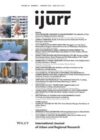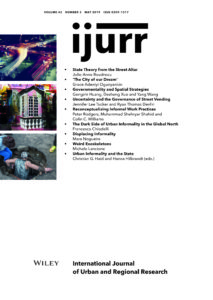Volume 43 Issue 3 May 2019
In this Issue...
Articles
The study of informality has become a prominent feature of debates in urban studies. This collection of articles expands and deepens the scope of study, specifically in three ways. First, as many of us have previously argued, urban informality must be understood in relation to the state, not merely as an effect of state practices but indeed as a key logic of state power. Such state power is often evident, as in the case of the formalization of street vending in Guangzhou, China, described by Huang et al., through the ordering of space. Tucker and Devlin foreground ‘negotiated legalities’ in Ciudad del Este, Paraguay, and New York City, USA, as an important example of this logic, while Nogueira emphasizes differentiated legitimacy of claims to space based on constitutional rights in Belo Horizonte, Brazil. Needless to say, we must also ask what functions as a state in any given context. Thus, Chiodelli’s essay, located in a town close to Milan in northern Italy, analyzes the production and governance of illegal housing by ‘a mafia-type criminal organization’. Second, several of the articles reinscribe urban informality by making evident practices of belonging and care. Lancione’s ethnography of underground Bucharest centers the ‘politics of life’ and ‘making of home’. Boudreau draws our attention to muscular forms of power as well as to forms of fidelity and redress. Of particular interest is the embodied nature of the politics of life, be it the socially embedded work relations, as in the account by Rodgers et al. of informal work practices in a Pakistani community in the UK, or Ogunyankin’s exposition of the ethico-politics of gendered resistance in Ibadan, Nigeria. Finally, these essays provoke important questions about the methodologies through which the study of urban informality can be undertaken. What are the ethnographic and archival methods that can uncover what Boudreau calls ‘traces of the state’? How do we, as she asks, build ‘state theory from the street altar’? What epistemologies and methodologies are needed to recognize and research what Lancione calls ‘the propositional politics’ of the underground city or the assembling of protection that constitutes ‘weird exoskeletons’? Such questions point to the after-lives of urban informality, new lines of inquiry that depart from the conceptualization of informality but that take us to uncharted spaces of humanity and inquiry.
— Ananya Roy
Interventions
This issue’s Interventions pieces help deepen the thematic focus on informality and the state. The seven brief pieces, which include an introduction by Christian Haid and Hanna Hildebrandt and concluding reflections by Julie-Anne Boudreau, utilize the five concepts of governance, agency, sovereignty, legitimacy and legality to reveal the ways that informal practices are implicated in the exercise of formal state authority. And while acknowledging and crediting the scholarship that has earlier demonstrated informality as a key logic of state power, the authors contributing to this collection maintain that this insight has largely remained confined to the postcolonial contexts in which it originated. In order to further transcend and help dismantle unproductive geographic divides, the selected cases highlight the state-informality nexus in urban areas in France, Poland, the UK, the Netherlands, and Hong Kong, contexts typically understood to have the capacity to regulate their populations and eliminate informality. But rather than simply applying the study of urban informality to cases in the North, the authors reflect on the work of translation required for communicating across contexts. This reflection, while present across the individual cases, is addressed most directly in Boudreau’s concluding essay, in which she commends the authors for undertaking the ambitious task of rethinking the boundaries, functions, and activities of state through rich, empirically grounded cases of the city, or what she has earlier referred to as ‘transurban language of urbanization’.
— Liza Weinstein
Articles
Uncertainty and the Governance of Street Vending: A Critical Comparison Across the North/South Divide
Published online on Apr 5th, 2019 | DOI: 10.1111/1468-2427.12792
State Theory from the Street Altar: The Muscles, the Saint and the Amparo
Published online on Oct 18th, 2018 | DOI: 10.1111/1468-2427.12694 (p 405-422)
‘The City of Our Dream’: Owambe Urbanism and Low‐income Women’s Resistance in Ibadan, Nigeria
Published online on Jan 10th, 2019 | DOI: 10.1111/1468-2427.12732 (p 423-441)
Governmentality and Spatial Strategies: Towards Formalization of Street Vendors in Guangzhou, China
Published online on Jan 8th, 2019 | DOI: 10.1111/1468-2427.12730 (p 460-475)
Reconceptualizing Informal Work Practices: Some Observations from an Ethnic Minority Community in Urban UK
Published online on May 10th, 2019 | DOI: 10.1111/1468-2427.12774 (p 476-496)
The Dark Side of Urban Informality in the Global North: Housing Illegality and Organized Crime in Northern Italy
Published online on Apr 5th, 2019 | DOI: 10.1111/1468-2427.12745 (p 497-516)
Displacing Informality: Rights and Legitimacy in Belo Horizonte, Brazil
Published online on May 7th, 2019 | DOI: 10.1111/1468-2427.12808 (p 517-534)
Weird Exoskeletons: Propositional Politics and the Making of Home in Underground Bucharest
Published online on Apr 5th, 2019 | DOI: 10.1111/1468-2427.12787 (p 535-550)
Interventions
Urban Informality and the State: Geographical Translations and Conceptual Alliances
Published online on Jan 30th, 2019 | DOI: 10.1111/1468-2427.12700 (p 551-562)
The Myth of Formality in the Global North: Informality‐as‐Innovation in Dutch Governance
Published online on Jan 29th, 2019 | DOI: 10.1111/1468-2427.12706 (p 563-568)
Informality as Structure or Agency? Exploring Shed Housing in the UK as Informal Practice
Published online on Jan 29th, 2019 | DOI: 10.1111/1468-2427.12705 (p 569-575)
Sovereignty Beyond the State: Exception and Informality in a Western European City
Published online on Jan 29th, 2019 | DOI: 10.1111/1468-2427.12704 (p 576-581)
Juggling Legitimacies: Informal Places for Burials and Worship in Hong Kong
Published online on Jan 29th, 2019 | DOI: 10.1111/1468-2427.12703 (p 582-588)
Rule of Law and Rules‐Lawyering: Legal Corruption and ‘Reprivatization Business’ in Warsaw
Published online on Jan 29th, 2019 | DOI: 10.1111/1468-2427.12702 (p 589-596)
Informalization of the State: Reflections from an Urban World of Translations
Published online on Jan 29th, 2019 | DOI: 10.1111/1468-2427.12701 (p 597-604)
Book Reviews
Richard Sennett 2018: Building and Dwelling: Ethics for the City. London: Penguin Books
Published online on May 10th, 2019 | DOI: 10.1111/1468-2427.12801 (p 605-606)
Nikhil Anand, Akhil Gupta and Hannah Appel (eds.) 2018: The Promise of Infrastructure. Durham, NC and London: Duke University Press
Published online on May 10th, 2019 | DOI: 10.1111/1468-2427.12802 (p 606-608)
Erik Swyngedouw 2018: Promises of the Political: Insurgent Cities in a Post‐Political Environment. Cambridge, MA: MIT Press.
Published online on May 10th, 2019 | DOI: 10.1111/1468-2427.12803 (p 608-609)
Barbara Schönig and Sebastian Schipper (eds.) 2016: Urban Austerity: Impacts of the Global Financial Crisis on Cities in Europe. Berlin: Theater der Zeit
Published online on May 10th, 2019 | DOI: 10.1111/1468-2427.12804 (p 610-611)
Giovanni Picker 2017: Racial Cities: Governance and the Segregation of Romani People in Urban Europe. Abingdon: Routledge—Advances in Sociology Series
Published online on May 10th, 2019 | DOI: 10.1111/1468-2427.12805 (p 611-613)
Andrew J. Diamond 2017: Chicago on the Make: Power and Inequality in a Modern City. Berkeley, CA: University of California Press
Published online on May 10th, 2019 | DOI: 10.1111/1468-2427.12806 (p 613-614)
Tim Bunnell and Daniel P.S. Goh (eds.) 2018: Urban Asias: Essays on Futurity Past and Present. Berlin: Jovis
Published online on May 10th, 2019 | DOI: 10.1111/1468-2427.12807 (p 615-616)
Issues in this volume
January 2019
March 2019
May 2019
July 2019
September 2019
November 2019

